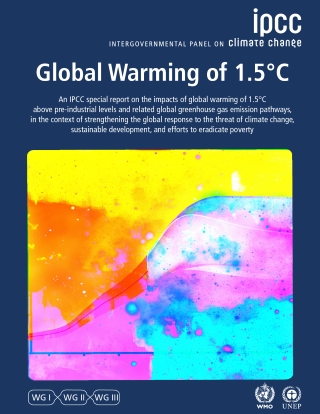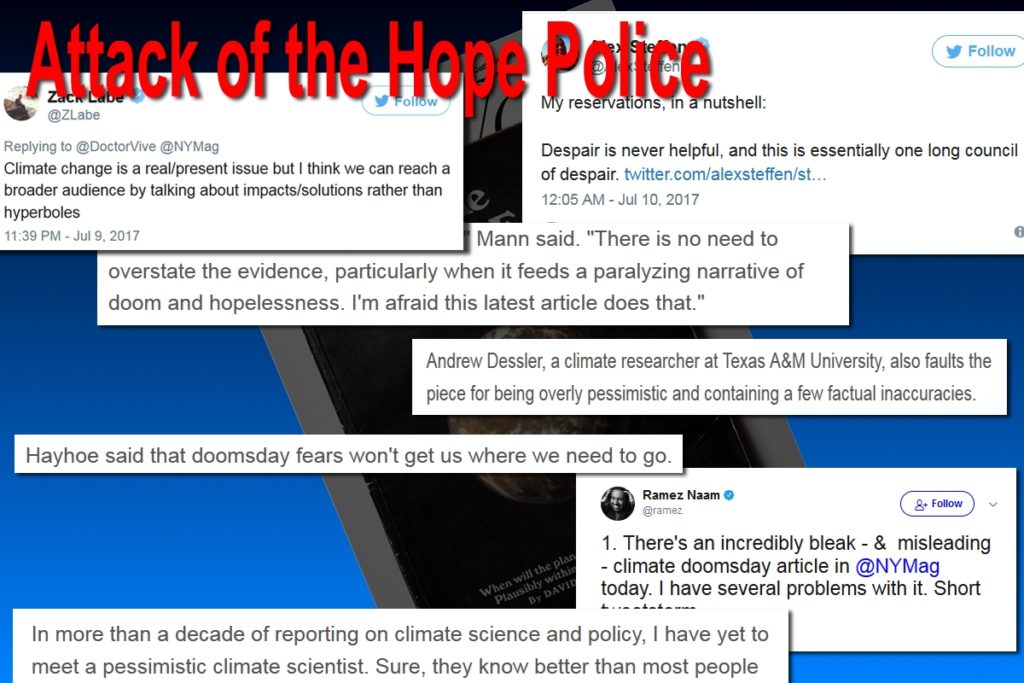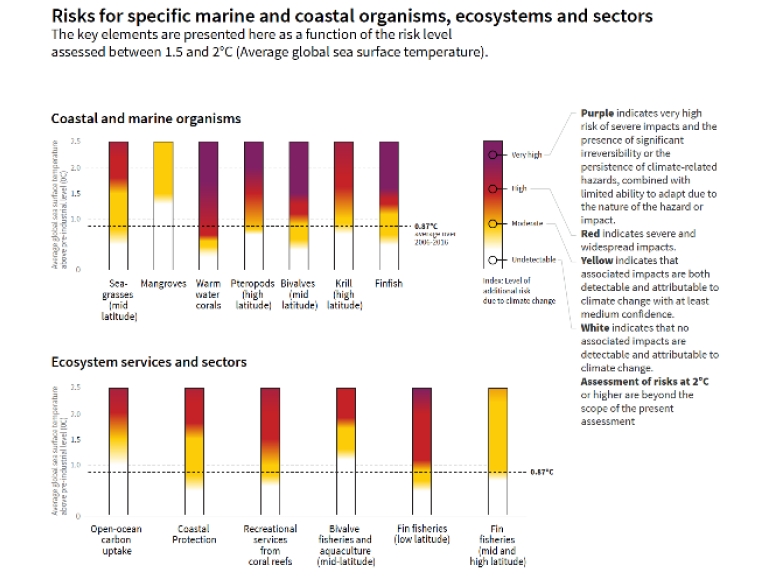Watts’ most recent essay is my new favorite big picture rant on climate change. If you pay attention you’ll see a theme of denial running throughout.
The Adorable Optimism of the IPCC
People have noticed.
I got it in Lviv. I got it in an epic email interview with BiFrost. I get it in pubs and emails, and from one disapproving professor at Concordia who— clearly regretting having invited me into her classroom— asked “So why do you even get out of bed in the morning?”
“You once described yourself as an angry optimist,” Erwann Perchoc asked me a few weeks ago. “Is that still true?”
Perhaps the tone of my writing has changed over the years. It was always what some insist on calling “dark”— but perhaps the shadows have deepened. Even a dozen years ago, the backdrop of my stories— not the plot or the theme, mind you, just the context in which the story took place— might have been described as a forlorn fire alarm: Jesus Christ, people, can’t you see the cliff we’re headed for? We have to hit the brakes! Now, though— well, in recent years I’ve written at least three stories with happy endings. And the reason those endings are happy is because they end in murder and massacre.
It’s not that I’ve given up hope entirely. But perhaps my narrative emphasis has shifted away from Avoid the Cliff and closer to Make the Fuckers Pay. Hope— dims, as time runs out. Anger builds.
And now, nearly a hundred world-class scientists throw a report at our feet that proves something I’ve recognized intellectually for years, although not so consistently in my gut: I’ve been just as childishly, delusionally optimistic as the rest of you.
Bear with me, though. Read on. I have at least one more happy ending in me.

It’s been a couple of weeks now since the IPCC report came out. You know what it says. If the whole damn species pulls together in a concerted effort “without historical precedent”— if we start right now, and never let up on the throttle— we just might be able to swing the needle back from Catastrophe to mere Disaster. If we cut carbon emissions by half over the next decade, eliminate them entirely by 2050; if the species cuts its meat and dairy consumption by 90%; if we invent new unicorn technologies for sucking carbon back out of the atmosphere (or scale up extant prototype tech by a factor of two million in two years) — if we commit to these and other equally Herculean tasks, then we might just barely be able to keep global temperature from rising more than 1.5°C.[1] We’ll only lose 70-90% of the word’s remaining coral reefs (which are already down by about 50%, let’s not forget). Only 350 million more urban dwellers will be exposed to severe drought and “deadly heat” events. Only 130-140 million will be inundated. Global fire frequency will only increase by 38%. Fish stocks in low latitudes will be irreparably hammered, but it might be possible to save the higher-latitude populations. We’ll only lose a third of the permafrost. You get the idea.
We have twelve years to show results.
If we don’t pull all these things off— if, for example, we only succeed in meeting the flaccid 2°C aspirations of the Paris Accords— then we lose all the coral. We lose the West Antarctic Ice Sheet and the Greenland Ice Shelf (not that it isn’t already circling the bowl, of course). Twice as many people suffer “aggravated water scarcity” than at 1.5°C; 170% more of the population deals with fluvial flooding. The increase in global wildfire frequency passes 60% and keeps going. Marine fisheries crash pole to pole. The number of species that loses at least half their traditional habitat is 2-3 times higher than would have been the case at 1.5°C. It goes on.
There’s no real point in worrying about a measly 2° increase, though, because on our current trajectory we’ll blow past 3° by century’s end (the Trump administration is predicting 4°, which is why they’re so busy dismantling whatever pitiful carbon-emission standards the US had already put into place; what’s the point of reducing profit margins if we’re headed straight for perdition no matter what we do?). We don’t really know what happens then. Methane clathrates released from a melting Arctic could turn the place into Venus, for all I know.
You probably know all this. You’ve had two weeks to internalize it; time to recoil, to internalize the numbers, to face facts.
To shrug, from what I can see. To go back to squabbling over gender pronouns, and whether science fiction has too many dystopias.
*

Remember last year’s New York Magazine article by David Wallace-Wells? It came pretty close to outlining the fate we’ve made for ourselves, closer than any bureaucrat or politician has ever dared. Remember the pile-on that happened in its wake? Activists and allies all decryig the story as hyperbolic and defeatist? Remember the Hope Police insisting that we had to inspire, not doomsay?
Where are they now?
One of them is Michael Mann, Climate Science superstar. Back in 2017 he shat on Wallace-Wells with everyone else: “There is no need to overstate the evidence, especially when it feeds a paralyzing narrative of doom and hopelessness.” And now here he is, just a few days ago: admitting that even this stark doomsday report is “overly conservative“, that it understates the amount of warming that’s already occurred. And Mann is still an optimist compared to, say, Prof. Jem Bendell, who argues that society is bound for inevitable collapse just a decade down the road and that we might as well start grieving now and avoid the rush. (He even wrote up a paper to that effect, but the policy journal he sent it to wouldn’t publish it until he rewrote it to be less “disheartening”.)
Still. Optimistic or not, this latest report is unprecedented by IPCC standards. It effectively offers, as The Tyee points out, a simple choice between Catastrophe and Disaster. It does, as a thoroughly-vindicated Wallace-Wells proclaims, give us “permission to freak out“.
So. Are we?
In terms of media reaction, the usual suspects say the usual things. Big Think and Rolling Stone go straight down the middle, admit the sitrep is dire, express doubts that we’ll doing anything about it even now. David Suzuki— well, zero points for guessing where David Suzuki comes down. The Tech folks are talking about geoengineering again. The Guardiantalks about food. Over at Medium, Daniel Estrada tries really hard to put a good spin on it, to work within the timeline of the IPCC Report and the US Election cycle to explore ways in which we might achieve the merely-disastrous Best Case— and then, halfway through, admits that he doesn’t really think any of it will happen, that this is merely a hopeful thought experiment, and in his heart of hearts he thinks we’re all well and truly fucked.

Over at the National Post— Canada’s answer to Fox News— some idiot named Kelly McParland blames the activists for everything, because they hectored and warned and complained for so long that who could blame the rest of us for tuning out? But perhaps the most telling reaction from the right wing comes courtesy of petro-shill Anthony Watts, who— unable to deal with the actual science— simply ran a cartoon showing IPCC authors whining for more money, alongside a guest editorial suggesting that even if it is all true, it would be way cheaper to just give everyone air conditioners.[2]
Of course, none of these folks wield any actual power. What they think doesn’t matter. What about the people who actually call the shots? How have the World’s Leaders responded to this latest 10-alarm fire, to this 12-year deadline?
Brazil is two days away from electing a far-right reactionary who has promised to quit the Paris Accords once elected. Germany— a world leader in environmental issues, not so long ago— reacted to the report with a profound “Meh”. Australia‘s Energy Minister dismissed it as a distraction from the more-important goal of lowering energy prices for Australians. Back in August France‘s Environment Minister resigned in disgust over his own government’s inaction on climate change; that was before the report’s release, but has Macron had a come-to-Jesus moment in the meantime? Here in Canada, provincial premiers are taking the Feds to court over a measly carbon tax; the government itself permitted an “emergency session” right after the report came out, a parliamentary debate which— as far as I’ve been able to tell— accomplished exactly fuck-all beyond one side of the aisle yelling Think of the Children! while the other yelled Think of The Economy!
And these are the progressive jurisdictions. I probably don’t have to tell you about Donald Trump’s hilarious “Instinct for Science“, which apparently allows him to dismiss the IPCC’s findings as biased even as he makes clear that he doesn’t actually know what the IPCC is.
And what about the world’s real leaders, the 0.01% who actually hand out marching orders to these presidents and premiers and prime ministers? Turns out they’re retaining consultants to advise them on how to prevent their personal security forces from killing them, once civilization has collapsed and their money’s no good any more. It seems to be a lot more than mere thought experiment to these people: global societal collapse seems to be their default scenario. They call it “The Event.”
Why, it’s almost as though they knew what was coming before the IPCC even tendered their report.
*
To me, one of the most interesting facets of this whole clusterfuck is how eager everyone is to tell us that It’s Not Our Fault. “Neoliberalism has conned us into fighting climate change as individuals“, the Guardian charges. “Capitalism Killed Our Climate Momentum“, claims Naomi Klein (who, in all fairness, I’ve admired ever since No Logo). Over at Slate Genevieve Guenther asks “Who Is the We in “We Are Causing Climate Change”?”, and saves us the trouble by answering herself:
“Does it include the 735 million who, according to the World Bank, live on less than $2 a day? Does it include the approximately 5.5 billion people who, according to Oxfam, live on between $2 and $10 a day? Does it include the millions of people, all over the world (400,000 alone in the 2014 People’s Climate March in New York City) doing whatever they can to lower their own emissions and counter the fossil-fuel industry?”
GQ reassures us that “Billionaires are the Leading Cause of Climate Change“. And I’ve lost count of the number of times I’ve read that a mere 100 companies are responsible for 71% of global carbon emissions.
To which I say, Bullshit. You’re all to fucking blame whether Naomi Klein wants to let you off the hook or not.
Not that I’m denying any of her arguments. They’re all true. We were certainly told— by supposed allies like Greenpeace and the PIRGs, as well as more obviously-nefarious corporations and governments— that if we all just recycled and ate one meat-free meal a week, we’d be Doing Our Part to Save the Planet while BP and the Koch Brothers continued to rape the biosphere. Up here in Canada, the reigning Liberals— for all their noble rhetoric about fighting climate change— are still buying pipelines and forcing Tar Sands down our throats and subsidizing Big Oil to the tune of over three billion dollars a year; the Conservative Opposition won’t even pay mealy-mouth lip service to the issue. Down in the states both mainstream parties are sucking too hard on the corporate teat to do anything that might actually endanger the profits of their owners. Individual actions can’t fix things: the very scale of the problem guarantees that institutional responses have always been necessary. All of this is true.
But you know what, people? There were always alternatives. You could have voted for Sanders. You could have voted Green. You could have voted for Ralph fucking Nader, when he was running. Hell, am I the only one who remembers Jerry Brown’s abortive run at the presidency, back in 1980? I still remember his announcement, the Three Priorities he laid out for his administration:
- Protect the Environment
- Serve the People
- Explore the Universe
That’s a damned good mission statement if you ask me. All it got him was jokes from Johnny Carson about how Jerry Brown had locked up the Grey Whale vote, and jokes from everyone else that usually revolved around the fact he was fucking Linda Ronstadt.
Of course he didn’t have a chance. Of course voting for him, or Nader, or the Greens was “throwing away your vote”. None of them had a chance.
And that’s my fucking point. It’s not that no one had heard of these people. It’s not that you weren’t familiar with their platforms. You knew what they stood for and you wrote them off. You were told they were fringe, that they never stood a chance, so you went out and made it true. You voted en masse for the status quo and the corporate teat-sucklers. Now Darby and Klein and Guenther trip over themselves to let you off the hook, to blame Capitalism and Neoliberalism and its stranglehold on the groupthink of modern politics— but how did you end up with leaders who so willingly abased themselves at that altar in the first place, you ignorant shit-heads? There were always alternatives, and you saw them, and you laughed.
Sure, the Neolibs conned you. Because you wanted to be conned.
Reap the whirlwind, you miserable fuckers. May your children choke on it.
*
So what’s left?
Every pundit on the planet is fond of pointing out that politicians can’t look beyond the next couple of election cycles— but twelve years is a couple of election cycles, more or less, and we’re still accelerating toward the cliff. Last weekend, The BUG and I talked about how we’d have to kill our cats before abandoning the house. We weren’t joking.
And yet— in my own way, I’m right with you in The Nile. I can still laugh at The BUG’s jokes. I still watch Netflix. I lie in bed with a sore back because Minion has been sitting on my chest for an hour and I don’t have the heart to disturb her. Sure, there are fewer insects, fewer frogs, less wildlife than I remember from childhood (more pigeons, at least. More raccoons)— but the ravine across the fence is still green, the sky still blue. The tag line on this ‘crawl remains as true as ever: I’m still In Love With the Moment, because I am not starving yet, because those I love are still doing okay, because all the birds have not quite come home to roost and there’s something so indescribably wondrous about being sapient, being able to look around and wonder at the universe. There is still so much to love in the Moment.
But the second part of that line is even truer: I am scared shitless of the future. Because those birds are closer than even I allowed myself to think, and not so far from now I could be a skeleton in the background of a Mad Max movie.
The only hope I can see lies in Donald Trump.
Don’t worry. This isn’t one of those contrarian bits of agitprop designed to provoke a reaction. I’m dead serious.
But when I speak of hope, I’m not talking about the world. I’m talking about hope for my country. I’m talking about hope for my family. Hope for maybe an extra decade or two before the ceiling crashes in. That’s the limited, desperate, end-of-need hope I pin on Trump and his enablers.

Because what do you do when your family is starving and the guys next door have food? What does any country do when drought and famine and heat waves are decimating its taxpayers while the cooler, luckier land to the north has enough— well, if not for all, at least for some? Will the governments of imploding regimes just sadly shake their heads, and— wracked with remorse for their shortsightedness— resign themselves to well-deserved apocalypse?
Of course, Canada’s hardly immune from the unfolding catastrophe (anyone from Fort McMurray could tell you that much). But we’ll still be better off than the US. Smaller temperature jumps. Less agro impact. Hell, our growing season could actually improve in the short term— and there’s lots of room to move north with the isotherms, even if northern soils don’t hold a candle to what we’re used to. Sorry, Inuit. You lose again.
So, yeah. If your family is starving and the house next door has food, you break in. You invade. And if the US invaded us now, we wouldn’t stand a chance. They’d Spread Democracy north of the 49th without breaking a sweat, and our pathetic little armed forces wouldn’t be able to do a damned thing about it. (Hell, the West Edmonton Mall used to have a bigger submarine fleet than the Canadian Navy; the only reason that’s not still true is because the Mall shut down their sub attraction in 2006.)
After a couple of terms of Trumpism, though, who knows?
The US is already at war with itself. It tears itself apart even as we speak: wagons circled, guns beyond counting all pointed inward. Trump and his ilk seem only too happy to spur them on. Maybe, given enough time, they’ll waste all that ammo on each other. Maybe that hypermilitary will be so busy guarding gated communities and mowing down protestors that they’ll forget to invade anyone else. Maybe— if Trump has his way— they’ll be so busy eating each other that by the time they remember us, they’ll have too many self-inflicted wounds to do much about it.
Maybe then we’ll have a fighting chance. Or maybe they’ll just leave us up here to die in peace, a few decades further down the road.
See? I told you I wasn’t out of happy endings.













